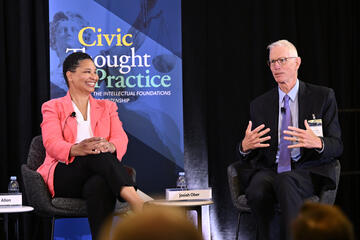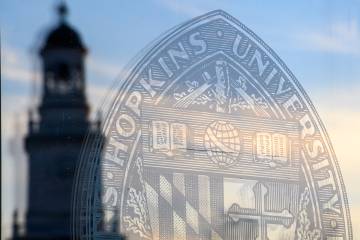- Name
- Johns Hopkins Media Relations
- jhunews@jhu.edu
- Office phone
- 443-997-9009
Johns Hopkins University and the American Enterprise Institute have announced the recipients of funding in the inaugural cycle of a new grant program designed to bring scholars from Hopkins and AEI together to work on research, teaching, or other projects—and to participate in the intellectual life of each other's institutions.
The JHU-AEI Fellowship Exchange Program will support 11 projects in its first cycle, each co-led by a JHU faculty member or members and a scholar from AEI, a leading center-right think tank based in Washington, D.C. Topics selected include the future of liberal education, bridging perspectives on the U.S. response to the COVID-19 pandemic, scientific rigor in a time of research funding reform, and how electoral incentives inhibit the ability of the U.S. Congress to achieve its constitutional mandate.
"We are delighted by the ways in which these JHU faculty and AEI scholars have come together to collaborate on these teaching and research endeavors," JHU President Ron Daniels said. "These projects reflect the extraordinary promise of bringing the full range of ideas into conversation with one another in a university setting."
AEI President Robert Doar said: "I am thrilled that JHU faculty and AEI scholars have enthusiastically embraced this opportunity to show how the competition of ideas in higher education and think tanks can serve the public good. Students, academia, policymakers, and the wider public will benefit enormously from research, programming, and teaching generated by these projects on some of the most contentious challenges facing our country."
Through its research, courses, and convenings, the fellowship program aims to model reasoned exchange across difference for students and scholars, build stronger bridges between the academy and the think tank sector, and emphasize the importance of bringing a broad range of perspectives and ideas into research that carries implications for the nation's common life.
The projects were awarded following a peer review of proposal by a committee comprising JHU faculty and AEI scholars. A second round of funding was recently announced, with proposals due by Oct. 6. More information about the program is available on the provost's office website.
The program is part of an emerging relationship between Johns Hopkins and AEI designed to encourage collaboration among scholars in the two institutions and model intellectual pluralism across the university community. The relationship also includes:
- The Civic Thought Project, which in May brought together policymakers, philanthropists, and scholars from more than 50 universities for a two-day conference focused on how universities can help strengthen civic life by cultivating engaged and informed citizens
- The Graduate Student Intellectual Diversity Initiative, which aims to encourage conservative, libertarian, and heterodox students and graduates to consider a career in higher education and offers to support them in their efforts
The projects selected for funding via the JHU-AEI Fellowship Exchange Program are:
Bridging Perspectives on the COVID-19 Response
Tony Mills (AEI) and Judd Walson (Bloomberg School of Public Health)
This project will convene a diverse group of scholars, policy experts, former and current U.S. government officials, international voices, and representatives from the private and non-profit sectors in a roundtable discussion to reflect on the divergent perspectives that have emerged regarding the success of the global and domestic COVID-19 response.
The conversation will not be a retrospective critique but a forward-facing exploration of how pluralism in expertise, values, and institutional roles can be constructively engaged in future crises.
Drawing on the roundtable conversation, the project leaders will issue a summary report, a communication toolkit, jointly authored commentary, and a proposal for sustained engagement. They will also jointly host a symposium to share results of the discussion with interested faculty and students at JHU.
Congress is Struggling. Can Changing How its Members are Elected Help?
Kevin Kosar (AEI) and Scott Warren (Krieger School of Arts and Sciences)
By most objective measures, the U.S. Congress is struggling to achieve its constitutional mandate. There has been much work done to assess how Congress can be improved by augmenting its capacity and upgrading its internal organization, processes, workforce, and technology.
There has been less study of whether changing the process of electing legislators can enhance the body's performance. We will study how electoral incentives affect legislative behavior, and whether altering how elections are conducted (e.g., replacing party primaries) could improve legislative functioning.
The project team will issue a report on their findings, host a public event at JHU and at AEI, and integrate their research effort with JHU's DC program in Spring 2026.
Economic Power in an Age of Global Turbulence
Hal Brands (School of Advanced International Studies) and Michael Strain (AEI)
Issues of economic and military security have become ever more closely interwoven. Unfortunately, these subjects are often studied in isolation from one another. Moreover, policymakers and academics often take very different approaches, and so there are not many opportunities for students to consider these subjects in ways that are informed by rigorous academic study but geared toward an understanding of pressing policy issues.
The project team will host a series of five discussions on the intersection of geopolitics and economics for a group composed of JHU students and AEI research assistants, and will invite other JHU faculty and AEI scholars to join these discussions as their expertise becomes relevant to unfolding policy issues.
The goal of the project is to create a forum for discussing potentially momentous policy changes, and their long-term impacts, in real time.
Five Questions on Shaping a Multipolar Order
Yuen Yuen Ang (Krieger School of Arts and Sciences) and Zack Cooper (AEI)
We are living through a profound transition from the post–Cold War era of U.S. primacy to an increasingly multipolar order—still centered on the U.S. and China, but with middle powers and even small states asserting greater voice and agency in global affairs. Yet U.S. foreign policy and the architecture of international governance remain tied to older paradigms premised on U.S. dominance and stable alliances in the liberal West.
This project asks a pressing question of scholarly and policy significance: What will it take to build a peaceful multipolar order?
The project leaders will host a two-day symposium at the Hopkins Bloomberg Center in Washington, D.C., with experts from academia, government, business, and media.
The Health Promoting Value of Work for Medicaid Enrollees with Mental Health and Substance Use Disorders
Matthew Eisenberg and Catherine Ettman (Bloomberg School of Public Health) and Sally Satel (AEI)
While many scholars agree that employment can be stabilizing and health promoting, there is disagreement about whether policies should require people with mental illness or addiction to work to receive treatment (for example, Medicaid work requirements).
This project will:
- Map each state's supported employment rules and reimbursement policies.
- Analyze national Medicaid claims to see who uses these services and for how long.
- Convene state and federal officials to set research goals.
The team will produce an academic paper and organize a policy briefing for federal and state officials on the results.
Liberal Education: A Contested Question
Robbie Shilliam (Krieger School of Arts and Sciences) and Ben Storey (AEI)
What is liberal education, and what should it be? If such an education liberates, what does it liberate from? What virtues does liberal education cultivate? How does liberal education relate to contemporary political debates, and how might it serve the public good?
This upper-level undergraduate course, co-taught by a professor of postcolonial politics at Johns Hopkins University and a conservative scholar at the American Enterprise Institute, brings together divergent perspectives through landmark texts on liberal education.
The conversation will address enduring questions about the character of liberal education as well as current controversies about what colleges and universities ought to teach.
A Managed Care Backlash Redux: Controlling Health Costs Amidst Growing Consumer Frustration
Benedic Ippolito (AEI) and Joseph Levy (Bloomberg School of Public Health)
This project will study the effects of modern utilization management tools such as prior authorization on patient access to drugs and inform broader policy debates about the balance between healthcare costs and access.
We will quantify real world impacts in pharmaceutical markets by leveraging a comprehensive large scale dataset of formulary management and claims information. This dataset enables us to measure how often utilization restrictions are imposed and to observe subsequent prescribing outcomes.
We will assess the extent to which these practices delay access to prescribed medications and drive patients to switch therapies or forgo treatment altogether.
Deliverables include:
- An academic paper
- A policy briefing
- A Capitol Hill briefing for congressional staff and health care stakeholders
- A public event in Washington, D.C.
- A guest lecture in a Johns Hopkins University class
Optimizing the Design and Conduct of Clinical Trials
Ann Ervin (Bloomberg School of Public Health) and Kirsten Axelsen (AEI)
Investment in clinical trials is vital for assessing the safety and efficacy of drugs, and streamlining the cost of development is necessary to ensure patients have access to lifesaving treatments.
Innovative trial designs can improve efficiency and lower costs, and broad stakeholder engagement is essential for adoption.
This collaboration will develop the first in a series of courses for key stakeholders and BSPH students on the economics of drug development and practical opportunities to advance innovation.
To inform the course, the team will organize a roundtable with JHU faculty and students, AEI scholars, and industry professionals. A reflection essay describing and assessing the fellowship experience will be shared with JHU and AEI colleagues.
- Course 1 on economics of drug development and innovation
- Roundtable to inform course design
- Reflection essay shared with JHU and AEI
Politics and Economics of the FIFA World Cup
Filipe Campante (School of Advanced International Studies, Carey Business School) and Stan Veuger (AEI)
This collaboration will involve teaching a joint course on the politics and economics of the 2026 FIFA World Cup. Enrollment will be open to JHU students (50%) and members of AEI's Collegiate Network (50%).
The course will use the World Cup to engage an ideologically diverse group of students in conversation around key economic, political, and sociological issues.
Outcomes include deeper understanding of political economy and public policy, exposure to AEI's and JHU's research and culture, and expanded student networks.
Practical Cost Benefit Analysis Seminar
Richard Bruns (Bloomberg School of Public Health) and Philip Wallach (AEI)
An AEI scholar and a JHU scientist will jointly lead a seminar on using cost benefit analysis as a communications tool to inform stakeholders about public policies.
All participants will complete an original analysis of a policy in their area of expertise that has not previously been the subject of a cost benefit analysis. The seminar will also place this work in context by considering the appropriate role for cost benefit analyses in the policy process.
- Location: AEI
- Audience: Open to JHU and AEI affiliates, including alumni, with priority for AEI analysts and JHU graduate students and early career researchers doing policy oriented work
- Outcome: Original cost benefit analysis by each participant
Scientific Rigor Meets Funding Reform: Rethinking Research Proposal Assessment
Gundula Bosch (Bloomberg School of Public Health) and Tony Mills (AEI)
The goal of this project is to appraise existing and alternative methods for evaluating research proposals in the United States and internationally, with a focus on how these approaches affect scientific rigor, reproducibility, and responsible decision making.
The team will examine multiple evaluation frameworks, including:
- Systematic review of criteria used across agencies and foundations
- Utility forecasting approaches, including impact predictions for high risk research
- Alternative scoring systems designed to reduce bias
- Opportunity cost analysis methods for optimizing resource allocation
- Science lotteries and other innovative mechanisms
Deliverables include a comprehensive report, a technical report and policy digest, and a public facing essay. The project leaders will also host at least one convening workshop at AEI with representatives from JHU, AEI, and other project affiliated organizations.
Posted in University News, Politics+Society










